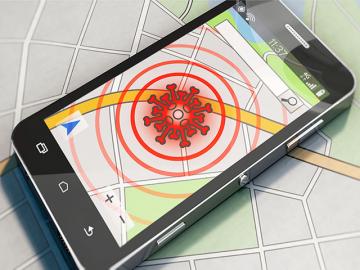Tech answers to COVID-19 should also safeguard fundamental rights

“Technology can guide governments in navigating their responses to the COVID-19 pandemic,” says FRA Director Michael O’Flaherty. “However, like all solutions, governments need to take care that respect for fundamental rights forms part of our public health strategies. This includes maintaining privacy and data protection legal safeguards.”
This second Coronavirus pandemic in the EU: fundamental rights implications report looks at the measures EU Member States use to address the pandemic to highlight rights-respectful approaches that other Member States can learn from.
It underlines the need to carefully and regularly assess the impact on people’s fundamental rights as governments manage the pandemic:
- Users’ data, their privacy, data protection and other rights: Many countries allow health and police authorities to access traffic and location data from telecommunication providers to track individuals, such as those under quarantine. Governments are also rolling out the development of contact-tracing apps to curb the spread of the virus. Many consulted with data protection authorities and/or experts to ensure compliance with EU data protection rules.
- Governments should ensure they implement all fundamental rights’ legal safeguards when protecting health, including free and informed consent, and not extending the use of the personal data collected. Efforts to make the apps source code public should continue to enhance transparency and confidence in using such tools.
- States of emergency: Many governments introduced or prolonged states of emergency or equivalent to manage the pandemic.
- Governments should carefully assess the fundamental rights impact of emergency measures when limiting and enforcing freedom of movement and assembly.
- Daily life: All EU governments maintained physical and social distancing measures. This had a wide-ranging impact on fundamental rights, such as the rights to freedom of movement and of assembly. Public health controls at the border also led some countries to suspend asylum procedures. Rights relating to work, education and access to justice were also affected. As almost all education facilities remained closed in April, some switched to distance learning.
- Governments should find ways to offset existing inequalities for those children that have remote access difficulties. These include migrant or minority children, children from poorer families, and children with disabilities.
- Vulnerable groups: some people are more at risk than others because of the difficulty of physical distancing in residential care homes and prisons or overcrowded homeless shelters. Stay at home measures also disproportionately affect some groups like Roma whose livelihood often depends on working outdoors in markets, for example.
- Governments should continue to provide solutions to address the specific needs of these groups including maintaining social contact and support.
This is the second in a series of reports on the impact of the Coronavirus across the 27 EU Member States. It covers measures in place from 21 March until 30 April 2020. It also includes findings from FRA’s Fundamental Rights Survey on people’s awareness of privacy settings on their mobile phones.
For more, please contact: media@fra.europa.eu / Tel.: +43 1 580 30 653.